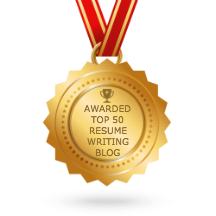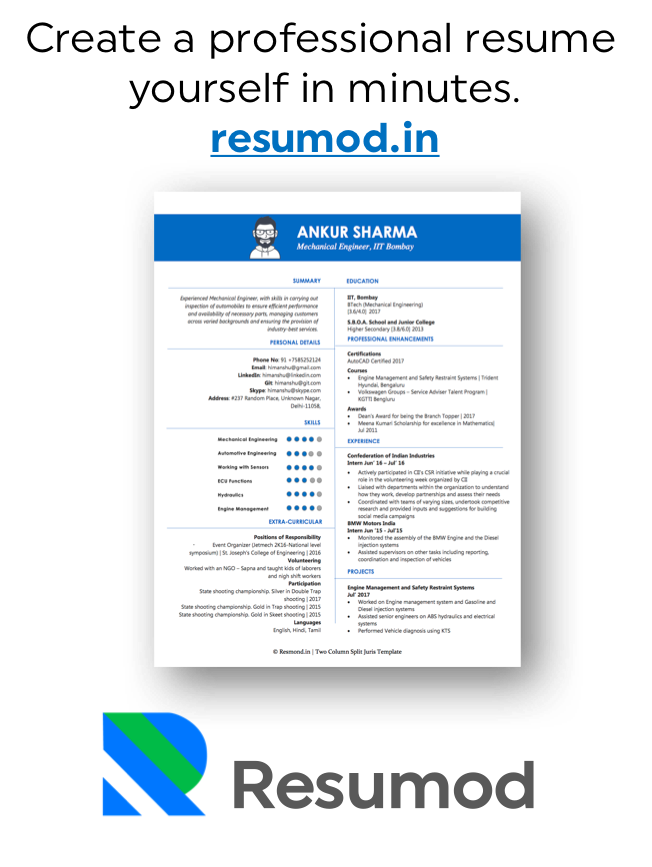It so happens with us mortals that suddenly others’ resumes begin to look much better than our own 🙂 Well, here are some guidelines and tips which can help you design your resume better than the rest.
1. Make a neat and error free Resume
Pay attention to detail and make sure there are no typos or grammatical errors in your resume. Have someone proofread your resume before you send it across because even the smallest error could become the reason for your resume’s rejection..
2. Make a powerful opening statement.
A solid, clear opening statement will not only make a good first impression but will sustain it throughout the resume. Opening ststements need not just be an Objective statement; it could also be a summary of your skills and your strengths.
3. Focus on how the employers will benefit from you
Remember, your first goal is to get that interview. Highlight those achievements that will arouse the interest of employers and consultants. Try and answer the question: “How can this candidate help this organization?”
4. Prioritize
It is often said that employers spend less than 30 seconds scanning a resume. This may or may not be true, but then why take a chance! Most employers are more concerned about career accomplishments than academic ones. So, place the most interesting facts about yourself at the beginning.
5. Highlight your skills
Have a section titled skills or technical capabilities in your resume that is distributed around your main talents. Again, prioritize everything.
6. Use keywords
This is perhaps the most important part. Simple keywords can make a lot of difference in a resume. For e.g. your extra-curricular activities section can be renamed to Voluntary Initiatives which sounds more pleasing and arouses the reader’s interest. Similarly, try to include specific keywords and industry specific phrases that describe your skills and experience throughout your resume.
7. Make use of industry jargon
Use industry jargon, phrases and acronyms to reflect your stronghold in the industry and familiarity with the employer’s work. Always spell out acronyms in parentheses if they are not obvious, such as TQM (Total Quality Management).
8. Use action verbs
Highlight your talents and traits using such verbs like active, accomplished, managed, launched, created, directed, established, organized, supervised. Portray yourself as an individual who is capable of contributing.
9. Avoid personal pronouns
Avoid using personal pronouns such as ‘I’ or ‘me’ in your resume. These words are often taken as reflecting pride and go negatively with the employer. Instead of complete sentences, use short Action-Impact statements, like: “Lead a team of 4 talented individuals to create an iPhone GPS application in record 2 days’ time.”
10. Emphasise key points
Use bold, italics, and underlining to emphasise the most relevant information in your resume. For resumes in which only ASCII text is used, use capital letters, quotation marks, asterisks, to emphasize important words or section titles.
11. List the most recent information first
The general rule of thumb is to show only your last 10 years work experience, unless the prior experience is specially relevant to the position. In any case, your resume should show the most recent information first in a reverse chronological order.
12. Quantify or qualify experience
No one can argue with numbers and facts. Instead of writing debatable statements like “Responsible for increasing sales in my territory,” write “Increased sales in my territory by 50% over 6 months.”
13. Be organized, logical, and concise
Apart from knowing about your experience, employers also use resumes as a tool to sense whether you are organized, logical, and concise. Make a genuine effort to organize your resume and make it neat and visually appealing with a consistent flow. Separate sections clearly and highlight titles. Leave sufficient blank spaces between sections but not too much. Create a resume in under 2 pages.
14. Use simple vocabulary
Use industry jargons but don’t try to impress employers with an exquisite vocabulary. Use words everyone can understand.
15. Avoid salary information
Never talk about salary in your resume. Discuss this in the interview.
16. Avoid questionable/sensitive subjects
Never refer to personal information such as race, religion, political inclination, or even personal views in your resume. In most cases, it is illegal for the employer to consider such issues. Also, avoid humor, idioms and clichés in your resume.
17. Be honest
Absolutely. Lying or exaggerating your abilities will not only be unethical, it might come and hit back at you as most employers conduct rigorous background checks for all candidates.
18. Sell your strengths
Portray your talents and abilities in the best possible light. Your resume should reflect your best personal characteristics and positive traits.
To de-emphasize gaps in your work history, consider a Functional format for your resume rather than a Chronological format. A functional resume focuses on your skills and accomplishments while the Chronological one highlights the progression of your experience.
19. Personal traits
Clichéd phrases like “Dependable, Highly-Organized, Self-Motivated, and Responsible,” are ignored by HR managers these days as almost all resumes have these words written! Rather than just listing these traits, try to give an example demonstrating them. Like, instead of writing “Dependable”, you could write “Never missed an important deadline in five years as a technical lead.”
20. Combine sections
Combine short sections to make your resume compact. For example, if you have just one entry under training, place it under Educational Details and change the section title to “Education and Training”.
21. Use common section headings
Use common section headings so that employers can easily search for any specific information they might be looking for. Examples: Objective, Experience, Employment, Work History, Skills, Summary, Summary of Qualifications, Voluntary Initiatives, Accomplishments, Honours and Achievements, Capabilities, Education, Professional Affiliations, Publications, Licenses and Certifications.
22. Be positive
Avoid any negative words or comments in your resume, especially when it comes to previous employment experiences. Show a positive, can-do attitude.



